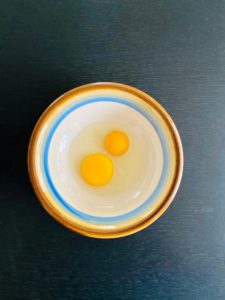While most businesses were badly impacted by COVID-19, the pandemic presented a business opportunity for Vinita Choolani. Prior to starting up the food tech startup Float Foods, Vinita helped to build Singapore-based women’s healthcare company INEX INNOVATE, which was valued at USD 72 million in 2019.
She is also the co-founder and board member of Project Smile, a not-for-profit initiative that offers financial assistance to women in Singapore with a focus on imparting skill sets for sustainable careers and eventual economic independence.
“I am passionate about building meaningful startups, technology and innovation, and pulling all these levels to create businesses that will change lives for the better,” she told Vulcan Post. According to Vinita, the founding team of Float Foods is a team of five comprising food scientists, researchers and the commercial team.
She recounted how supermarket shelves were emptied amid bouts of panic buying, so she couldn’t get her hands on any eggs or milk. That very incident ended up being the catalyst that lit the spark behind Float Foods. She realized that food security is a “huge issue in Singapore” and felt the need to find a better way of securing our food systems.
Therefore, Float Foods was established with a mission to innovate, develop and advance Singapore’s plant-based foods ecosystem. “We went into plant-based foods because we believed it was the cleanest, most straightforward way for Singapore to be self-reliant and create its own produce,” Vinita explained.
Moreover, with innovations in plant-based foods, they hope to be able to contribute to Singapore’s food safety, whilst being sustainable, and enabling consumers to eat healthy food. The plant-based whole egg substitute was the first idea on the drawing board when the startup was incorporated in June and within six months, it has achieved the proof-of-concept status.
In a way, the COVID-19 pandemic also presented her with a business opportunity as she seeks to address the food security gap. Their research revealed that Singaporeans consume almost 2 billion chicken eggs annually, of which 70% are currently imported from Malaysia. Relying on the status quo would keep Singapore extremely susceptible to food supply disruptions, they noted.

Moreover, Vinita is confident that now presents a viable timing for standalone plant-based alternatives. She cited that Singapore has thrown away over 250,000 eggs due to oversupply. That, coupled with the rising concerns of animal disease transmission such as the avian flu—which has proven to be deadlier than COVID-19 and is prone to more frequent outbreaks—as well as the harmful effects of hormone injections administered to chickens to boost egg production are some key motivating factors.
Float Foods recently announced a breakthrough in its bid to join the race for innovation in alternative proteins with its debut plant-based protein product. Called OnlyEg, it is Asia’s first commercial plant-based whole egg substitute that offers an egg yolk and egg white replacement. It uses legumes-based substitutes for both egg yolk and egg white, and is the first of its kind to achieve the level of likeness to a real chicken egg.
According to Float Foods, the closest alternatives in the market are currently liquid blends of egg substitutes that are limited to scrambled eggs and omelets. With OnlyEg however, it can be prepared into multiple egg dishes such as sunny side-up, overeasy, or soft boiled.
More nutritious
Its ability to reproduce different styles of eggs that are commonly found in Asian cuisine is in line with Float Foods’ key vision to create a plant-based food ecosystem within Singapore that caters to the Asian diet. She added that the R&D process for their plant-based whole egg substitute is still ongoing as they work on the nutritional component of OnlyEg.
Currently, the nutritional benefits of OnlyEg is being developed to be higher than that of a chicken egg. “Matching the nutritional make-up is only the beginning of what we want to achieve,” said Vinita. “Eventually we want to be able to create variations of our plant-based products that are embedded with nutritional properties that can enhance the lives of consumers with different dietary needs.”
When asked about funding, Vinita revealed that they are currently raising capital through a Series A round and are looking for strategic investors who are aligned with their vision. Particularly, they want their supply chains to be within their borders. Therefore, they want to ramp up their investment in local production so they can make a “substantive impact on our food supply and security.”
With a little help
However, as no other players have paved the way in this area, they expect to face manufacturing challenges. They plan on working with institutions like the Agency for Science, Technology and Research (A*STAR), Singapore Institute of Food and Biotechnology Innovation (SIFBI), food incubator Innovate 360, and Singapore Polytechnic Food Innovation and Resource Centre (FIRC) to help them navigate these challenges.
Commenting on the food tech landscape in Singapore, Vinita noted that we already have a “wonderful infrastructure”. “This has allowed game-changing food tech companies such as Karana and Turtle Tree to flourish. (However), there are still untapped opportunities in the plant-based space, for instance in bio packaging.”
Sharing their future business plans, Float Foods said that they have completed proof-of-concepts for OnlyEg and other alternative protein products including plant-based yoghurt, cheese, and blended egg patties and shreds.
They are preparing OnlyEg for commercial readiness by 2022, with support from Singapore’s research and innovation agencies to optimize their product. She added that they will be releasing a series of proprietary plant-based products in phases across the next two years.
This article was originally published by Vulcan Post.

